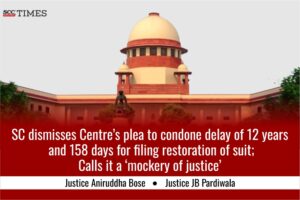Supreme Court: In a civil appeal by the Union of India against an order of the Bombay High Court, whereby the Court declined to condone the delay of 12 years and 158 days in filing the application for restoration of a writ petition, the Division Bench of Aniruddha Bose and JB Pardiwala*, JJ. dismissed the appeal and upheld the impugned order. The Bench said that the ‘sword of damocles’ cannot be left hanging over the head of the respondent for indefinite period of time to be determined at the whims and fancies of the appellant.
The matter at hand came into being on the breach of the terms of the lease deed by the Union of India (‘appellant’). The respondent instituted a civil suit for the recovery of the possession of the suit property and arrears towards the rent. The Trial Court allowed the civil suit and passed a final decree holding the present respondent to be entitled to possession of the suit property. The dismissal of the appeal against the Trial Court’s decision was challenged before the High Court, whereby, the High Court dismissed the same for non-prosecution vide order dated 10-10-2006. The present appellant was served with the notice by the Executing Court in the execution petition for the execution of the decree. However, the Execution Order was set aside by the Executing Court. On 12-04-2019, the present appellant sought restoration of the petition before the High Court and condonation of delay of 12 years and 158 days in preferring such restoration application. The High Court declined to condone the delay of 12 years and 158 days in filing the restoration application, hence, the present appeal.
Whether the High Court committed any error in passing the impugned order and whether sufficient cause was made out for condonation of such a long and inordinate delay?
The Court noted that in the impugned order, the High Court made a reasonable suggestion to the appellant that if the possession of the suit property is handed over to the respondent, then probably the Court may consider restoring the petition which came to be dismissed for default on 10-10-2006, however, the appellant declined to hand over the possession of the suit property to the respondent herein. The Court reiterated the very same suggestion, however, the same was refused by the appellant.
On the question of prejudice caused to either side by the condonation of delay, the Court said that it hardly matters whether a litigant is a private party or a State or Union of India when it comes to condoning the gross delay of more than 12 years. If the litigant chooses to approach the Court long after the lapse of the time prescribed under the relevant provisions of the law, then he cannot turn around and say that no prejudice would be caused to either side by the delay being condoned. The Court clarified that the litigation between the parties started in 1981 and till date the respondent was not able to reap the fruits of his decree, even after 43 years. The Court stated that “it would be a mockery of justice if we condone the delay of 12 years and 158 days and once again ask the respondent to undergo the rigmarole of the legal proceedings.
The Bench said that the ‘length of the delay’ is a relevant matter which must be considered while deciding whether the delay should be condoned or not. In the matter at hand, the Court said that it appellant want to fix their own period of limitation for instituting the proceedings for which law has prescribed a period of limitation. The Court said that once a party has lost right to have the matter considered on merits because of his own inaction for long, it cannot be presumed to be non-deliberate delay and the party cannot plead that the substantial justice deserves to be preferred against the technical considerations.
The Court explained that while considering plea for condonation of delay, the Court owes a duty to first ascertain the bona fides of the explanation offered by the party seeking condonation and must not start with the merits of the main matter.
“The question of limitation is not merely a technical consideration. The rules of limitation are based on the principles of sound public policy and principles of equity.”
On perusal of the impugned order, the Court noted that the High Court had pointed bona fide lackings in the appellant’s application and that there was no sufficient cause for condoning the unpardonable delay of 12 years and 158 days.
Further, the Court referred to Oriental Aroma Chemical Industries Limited v. Gujarat Industrial Development Corporation, (2010) 5 SCC 459, wherein, the Court had rejected an application for condonation of delay of 4 years in filing an application to set aside an ex-parte decree on the ground that the explanation offered for condonation of delay was not satisfactory.
The Court also referred to Postmaster General v. Living Media India Limited, (2012) 3 SCC 563, wherein, an application for condonation of delay of 427 days in filing the Special Leave Petition aa dismissed and it was held that condonation of delay is not an exception, and it should not be used as an anticipated benefit for the government departments. The Court also discussed several authorities on the subject to arrive at the conclusion. The Court reiterated that delay should not be excused as a matter of generosity.
The Court concluded that the High Court did not commit any error in passing the impugned order, as the appellants had failed to prove that they were reasonably diligent in prosecuting the matter and the vital test for condoning the delay was not satisfied in this case. Hence, the Court dismissed the appeal.
CASE DETAILS
Citation: Appellants : Respondents : |
Advocates who appeared in this case For the appellant: For the respondent: |
CORAM :

